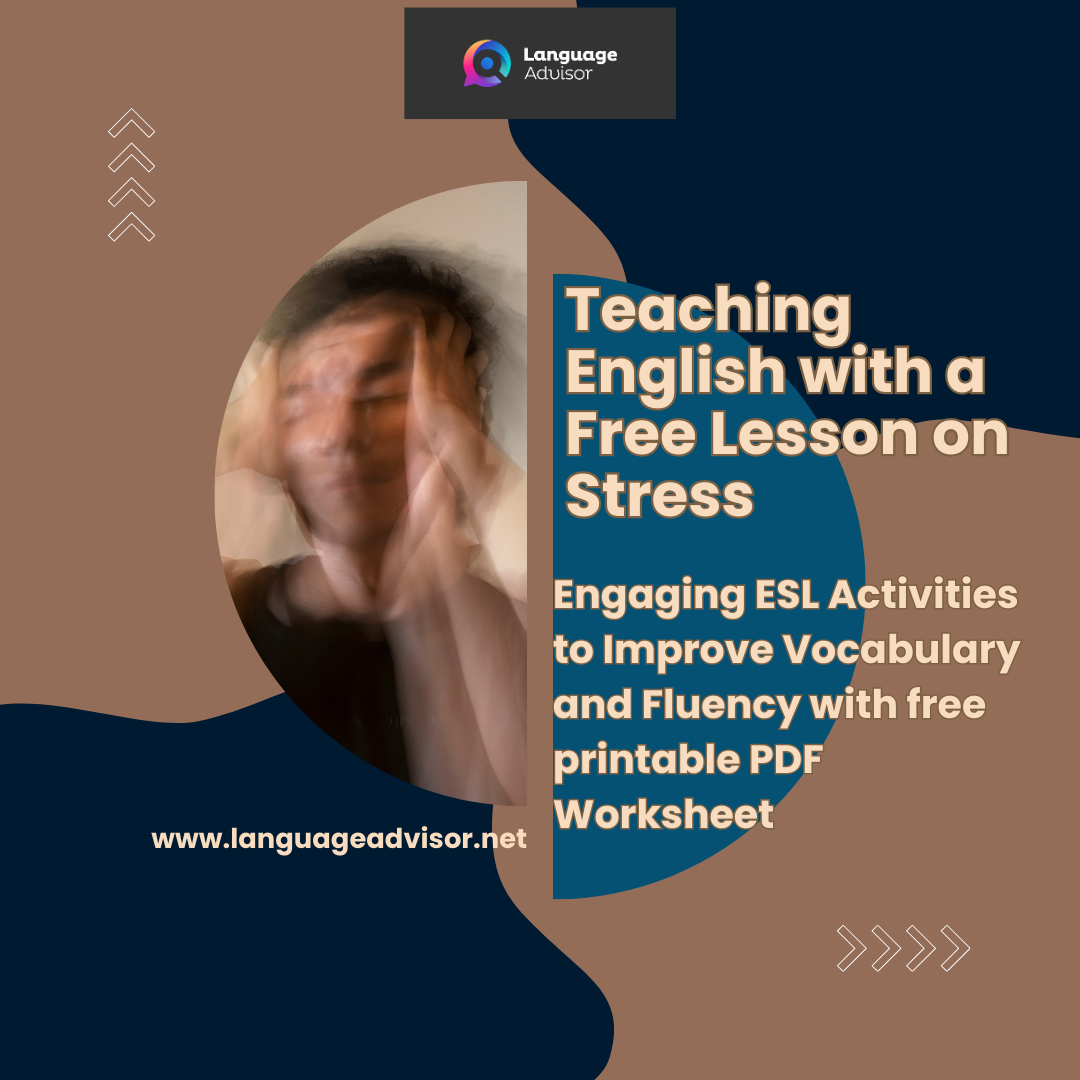Teaching English with a Free Lesson on Stress: Engaging ESL Activities to Improve Vocabulary and Fluency with free printable PDF Worksheet
Teaching English with a Free Lesson on Stress

Teaching English with a Free Lesson on Stress
Are you looking for an interactive ESL lesson on stress? This free English lesson plan is designed to help students expand their vocabulary, improve fluency, and practice present tense and modal verbs through engaging discussions and activities.
Why Teach a Lesson on Stress?
Stress is a universal topic that students can easily relate to, making it perfect for ESL conversation practice. This lesson helps learners:
✅ Improve their speaking skills through discussion-based activities
✅ Expand their vocabulary on stress and relaxation
✅ Practice using modal verbs (should, must, can) in context
✅ Develop critical thinking by reflecting on stress management strategies
Lesson Plan: Stress and How to Manage It
Objective
To encourage fluency and introduce new vocabulary related to stress, relaxation, and well-being while focusing on the present tense and modal verbs.
Materials
📄 Stress Quiz Worksheet (included below)
Warm-Up: Stress Quiz (Student Activity)
Start the lesson with this interactive stress quiz. Students score themselves and discuss their results.
How to Calculate the Score:
- Add up the numbers from the quiz.
- Subtract 20 from the total.
- Results:
- 30+ → You may be vulnerable to stress.
- 50-75 → High stress levels, take care!
- 75+ → Extremely vulnerable to stress!
📝 (This test was developed by Boston University Medical Center psychologists Lyle Miller and Alma Dell Smith.)
Encourage students to compare scores and discuss their results in small groups.
Discussion Questions
Use these ESL conversation questions to keep students engaged. Encourage them to use modal verbs like should, must, can, could in their answers.
1️⃣ What kinds of things make you stressed?
2️⃣ What are common symptoms of stress?
3️⃣ Do you think your quiz score was accurate?
4️⃣ Are there certain times of the year that are more stressful for you (e.g., holidays, exams, changing seasons)?
5️⃣ What do you usually do to combat stress?
6️⃣ What stress-relief methods would you recommend?
7️⃣ Do you think people today are more stressed than previous generations?
8️⃣ Is work the most stressful thing in your life? Would you take a pay cut for a less stressful job?
🗣 Encourage open discussions—correct grammar when necessary, but focus on fluency and confidence!
Useful Vocabulary for Talking About Stress
🔹 Verbs & Phrases
- To relax (e.g., “I like to relax by reading.”)
- To put your feet up (e.g., “After work, I just want to put my feet up.”)
- To unwind (e.g., “A warm bath helps me unwind.”)
- To get stressed out (e.g., “I get stressed out when I have too much work.”)
- To chill out (e.g., “You should chill out and not worry too much.”)
- To calm down (e.g., “Take a deep breath and calm down.”)
- To take time out (e.g., “I take time out for myself every evening.”)
- To sort out problems (e.g., “I need to sort out my problems before they get worse.”)
🔹 Adjectives & Nouns
- Stressful (e.g., “My job is very stressful.”)
- Hassles (e.g., “Daily hassles can add up and cause stress.”)
- Hectic (e.g., “My schedule is hectic right now.”)
- Chaotic (e.g., “The traffic in my city is chaotic and stressful.”)
🔹 Stress-Relief Methods
- Tranquilizers (though not recommended for casual use!)
- Herbal remedies (e.g., chamomile tea)
- Aromatherapy (e.g., using lavender oil)
- Essential oils (e.g., peppermint oil for relaxation)
Proverbs & Sayings About Stress
💡 A healthy mind in a healthy body.
💡 Early to bed, early to rise, makes you healthy, wealthy, and wise.
💡 No rest for the wicked!
💡 All work and no play makes Jack a dull boy.
Use these phrases to introduce idiomatic expressions into the lesson!
Final Activity: Stress Management Role Play
🗣 Scenario-Based Speaking Practice
- Pair students up and give them a stressful situation (e.g., preparing for an exam, planning a wedding, dealing with work deadlines).
- One student describes their stress, while the other gives advice using modal verbs (e.g., “You should take a break.” / “You must sleep more.”).
- Switch roles and repeat!
This fun and interactive ESL activity encourages students to use new vocabulary while improving their speaking fluency.
Conclusion
This stress-themed ESL lesson is perfect for improving fluency, vocabulary, and conversation skills while helping students reflect on an important real-life topic.
🔹 Key Takeaways:
✅ Students practice present tense and modal verbs.
✅ They learn and use stress-related vocabulary.
✅ They engage in real-life conversation practice.
📩 Want more free ESL lesson plans? Share this post with other teachers and let us know how it worked in your classroom!
💬 What other topics would you like lesson plans on? Drop your ideas in the comments!

DOWNLOAD THE PDF FOR FREE






